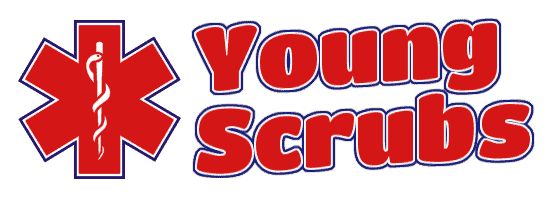This post may contain affiliate links, click here to learn more.
Whether you are a medical student, intern, or resident, you are likely to have to perform a basic neurological examination.
This includes an assessment of sensory and motor function, and reflexes to determine whether there is an impairment of the nervous system.
Before you start, it is best to have all the necessary equipment at hand. The essential instruments needed for a basic neurological examination includes:
- Medical penlight
- Reflex hammer
- Tuning fork
- Something soft (feather, cotton ball/swab, etc.)
- Something sharp (needle, paper clip, etc.)
Medical Penlight
A medical penlight is a universal tool that should be in the pocket of any doctor. Also, it is a vital tool in any basic neurological examination.
Here it is used to test the pupillary light reflex which involved cranial nerves II and III.
The penlight also comes in handy to examine the palate and gag reflex. This is important as it involves cranial nerves IX and X.
Like in my article about the best medical penlight. I recommend the Weltool M6-Dr Medical Penlight.
It is solid, durable and waterproof. More importantly, it gives off a superior light quality for your examination.
A less pricy option is the penlight from Risemart. This penlight is well suited for those who don’t want to put too much money into it, while still getting a solid product.
Another neat feature that makes it great for neurological examinations is the pupil gauge on the side of the pen.
Reflex hammer
The reflex hammer is as vital to a neurologist as the stethoscope is to the cardiologist.
This staple neurological instrument is used to examine the deep tendon reflexes. It is also used to elicit the plantar response/Babinski reflex.
My recommendation would be the tromner reflex hammer from MDF instruments. It is high quality, balance weighted. Also, it has both a large and small, soft, silicone mallet for precise tendon percussion.
The backend is sharper, which is ideal for testing the plantar reflex and skin sensation. Also, it is detachable, where the inner piece is a small brush that can be used for skin sensation examination.
If you are not ready to put that amount of money into a reflex hammer, I totally get it.
In this case, I would recommend the rounded reflex hammer also from MDF instruments. The rounded head enables precise tendon percussion. The pointed backend is good for testing the plantar reflex and skin sensation.
If you just need something that can elicit a reflex you can go for the cheaper, classic tomahawk shaped reflex hammer.
Tuning fork
To be honest, I skipped getting one of these initially. Later, I have come to realize how versatile this tool really is.
Now it is a permanent part of my arsenal. First of all, you can use the tuning fork to test a patient’s hearing.
Also, you can cool one of the sides in water and use it for temperature testing on the skin.
Finally, you can also use it to test for vibration sensation.
There is no need to get all fancy with your tuning fork, but make sure to get one that is suitable for medical examinations.
Tuning forks come with different frequencies of vibration (measured in Hz).
Higher frequency forks are better for auditory evaluation. Lower frequency forks are better for vibratory examination.
A fork with a frequency of 256 hertz, like this one QIYUN is adequate for a basic examination of both modalities.
What you don’t need to buy
When testing skin sensation you want to have both a sharp and a soft item. This enables you to test for sharp and soft touch.
If you get the reflex hammer from MDF instruments mentioned above, everything you need is included.
That being said, there are plenty of alternatives. And most can be found in every hospital or clinic.
For soft touch sensation, you can use a feather, cotton ball or cotton swab. For sharp touch, you can use a toothpick, bent paperclip, needle or safety pin.
Closing remarks
There are some sets available that include all the instruments I recommend above. but, these are generally poor quality.
Most come with the tomahawk reflex hammer which I don’t recommend. Also, most of these come with 2 or more tuning forks and scissors.
This is not necessary and makes the kit too big to carry around.
If you are interested in a set type solution, I would much rather recommend you to get a medical carrying case.
I like this one from BOVKE. I can fit all my instruments in it. This includes my tools for the neurological examination as well as my stethoscope, scissors, pens, etc.
